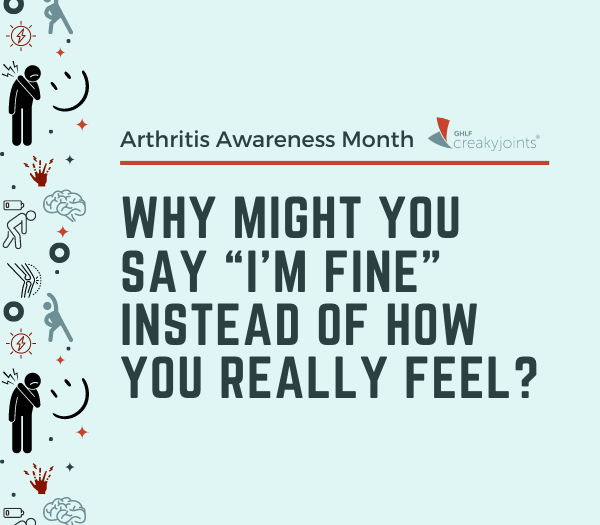

It’s Arthritis Awareness Month, and it’s time to break the silence and rethink how we communicate about arthritis. How often do we say “I’m good” or “I’m fine” when we’re not actually good?
We’ve gathered insights from the arthritis community to shed light on the daily struggles of living with this condition. We asked individuals how they describe their arthritis symptoms to others and why many choose to say “I’m fine” instead of revealing the full extent of their pain. Here is a sampling of their honest and heartfelt responses.
How Do You Describe Your Arthritis Symptoms to Others?
As you know all too well, explaining the joint pain and other symptoms of arthritis can be difficult — and others often don’t get it.
- “I just don’t bother because it leaves me frustrated and upset. So many people have said to me, ‘Oh don’t worry about that, everybody gets a bit as they get older.’ They have no idea about the difference between arthritis that is an autoimmune disease and osteoarthritis and would rather remain ignorant than try to understand.” — Wendy A.
- “I explain it by giving examples. When everything is at its worst, particularly in my feet and hands, I have to hobble out of bed since I can’t put any pressure on the balls of my feet. I can barely turn a doorknob with both hands to let the dogs outside. And then struggle to grip a butter knife just to put cream cheese on a bagel.” — Emily F.
- “That most of my energy goes into being comfortable whilst getting on with ordinary life. Constant background discomfort. Most people don’t really want to know or have very little comprehension.” — Mina S.
- “I often describe the pain in my joints as being like the horrible sickening ache you get from having a broken bone and that you also feel like you’ve got the flu (with the exhaustion and in my case feeling hot all the time).” — Amy F.
- “In easy terms for them, I say it’s like when you have the flu, even though that is just the tip of the iceberg.” — Janet V.
- “Nails in your joints.” — Kathleen F.
- “Painful, feels like some is stabbing me under my kneecaps. My other joints ache.” — Christy T.
- “Like having the flu, a sunburn, and a weighted blanket on at the same time while being the Tin Man before being oiled.” — Ann P.
Why You Might Say “I’m Fine” Instead of How You Really Feel?
Sometimes, it’s just easier to say “I’m fine.” Many people in our community feel this way, believing that others might not truly want to hear about their struggles. There’s often a worry that sharing too much will make them seem self-centered or like they’re complaining.
- “It’s too complicated to explain and too draining to do so. Especially when you’re constantly NOT FINE. It’s easier and more friendly to say I’m fine.” — Hayley R.
- “Everyone is sick of hearing about it.” — Beth O.
- “In all honesty, nobody truly cares. That is what my trauma is and remains. I’m self-aware. Hard to heal and break free from feeling like that when it’s been life-long.” — Michelle S.
- “I don’t want the focus of the interchange to be on me and my pain.” — Susan L.
- “I don’t want to be a complainer and they wouldn’t understand anyway.” — Becky P.
- “Most people don’t really want you to answer this honestly. It makes them feel uncomfortable.”— Dawn O.
- “Most people simply cannot comprehend living life every day in extreme pain, not to mention all the other symptoms and medication side effects that we deal with.” — Stephanie G.
- “Because people don’t understand.” — Topaz Ivory
Remember, it’s okay to not be okay and to reach out when you need support. As we raise awareness this month, let’s strive to create a more empathetic and informed environment where those with arthritis feel heard and understood.
Be a More Proactive Patient with ArthritisPower
Join CreakyJoints’ patient-centered research registry to track your symptoms, disease activity, and medications — and share with your doctor. Sign up.





